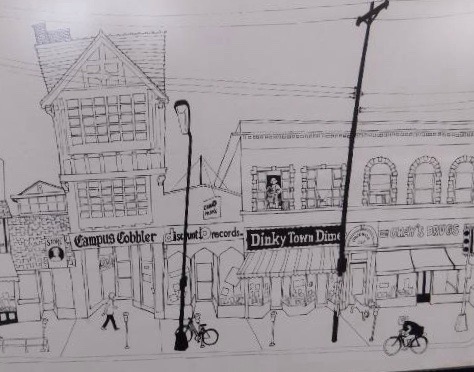OCTOBER 3, 2020 – I discovered escapism at the Gilombardo School of Music. The “program” every Saturday of my sixth and seventh grade school years involved a 40-minute drive to Minneapolis for classes in solfege and music theory, a private lesson, orchestra rehearsal, a brief visit with my grandfather, who lived nearby, and the trip home. It was a terrible waste of Saturdays, which were made for kids to play outdoors.
Based on their wits and vocabularies, the other kids were way above average. I resented the fact that they enjoyed what I detested. My loss. Mr. Gilombardo was the quintessential Renaissance man: he played the violin like Heifetz and was an accomplished painter and Golden Gloves boxing champion; during WW II, he’d been a tail-gunner on a B-17—and a parachutist after the captain cried, “Everyone bail!” I was too immature to be motivated by his genius. I bumped along with below average effort.
Between classes and rehearsals, kids wandered in and out of the “school,” which was above the Campus Cobbler in “Dinkytown”—the village off the main campus of the University of Minnesota. The more diligent students practiced hard between lessons and classes. Others sat quietly in the comfortable waiting area, paging through a large supply of coffee-table books. That’s where I hung out—on a sofa.
Directly across the room from the sofa was the school restroom. On the outside of the door hung a full-length mirror, and from my vantage point the frequent opening and closing of the door produced a kaleidoscope effect. I became intrigued by how that mirror could make fixed objects fly.
Because people entered and exited the restroom quickly, from the sofa I caught only glimpses of the inside. The walls were dark red, and another, smaller mirror hung on the wall opposite the door. Often the reflection of a wall light flashed on a small interior mirror. I also noticed a step up from the outer room into the rest room.
I never used the restroom myself but not because I never had to. (At day’s end, I’d rush to Grandpa’s house, where my dad waited for my sisters and me.) I didn’t want reality to disturb the alternate world I’d been constructing . . .
. . . The exterior “kaleidoscope” mirror, the step-up, the interior color, and the light in the inside mirror—always fleeting—triggered an imaginary escape route from the drudgery of my musical studies. The above-average kids surely saw and used the tiny room for what it was—a restroom. For me, it was the entrance to a magic kingdom, filled with endless, intricate refinements that dazzled the eye. Each Saturday I’d imagine whimsical additions that carried me worlds away from “diminished sevenths,” “do-mi-re-la,” and “five measures before ‘C’.”
I didn’t dare use the restroom for fear that if I saw the inside of the tiny space, I’d destroy . . . the magic kingdom. I’m glad I didn’t. My alternate universe allowed me to survive the violin until I could sing my own tune.
(Remember to subscribe to this blog and receive notifications of new posts by email.)
© 2020 by Eric Nilsson
